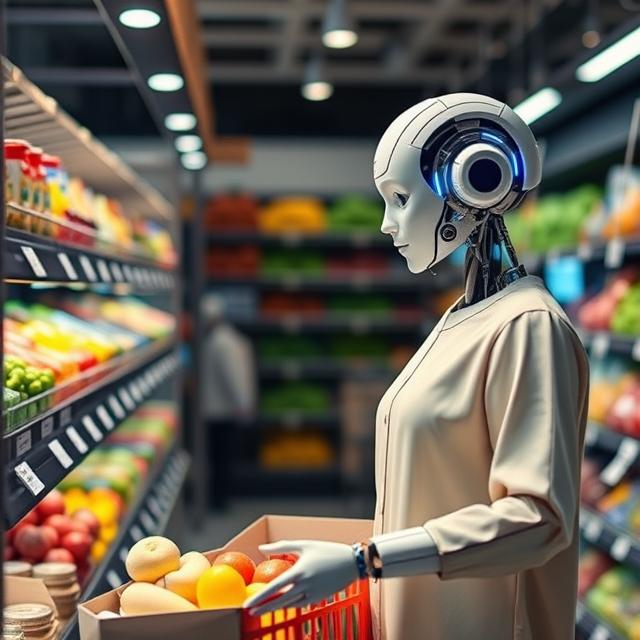AI in Personalized Grocery and Clothes Shopping Experience

Transforming Shopping with AI Algorithms
Artificial Intelligence (AI) is revolutionizing the shopping experience for consumers by introducing hyper-personalization. In both personalized grocery shopping and personalized clothes shopping, AI technologies are assisting retailers in anticipating, suggesting, and tailoring every purchase based on individual tastes. These types of solutions scan a vast amount of data past purchases, browsing, nutritional requirements, measurements, season of the year, even location—delivering a customized experience never before attainable.
Merchants are bringing AI onto websites and mobile applications to offer real-time recommendations. From suggesting lactose-free milk to a health-conscious consumer to the correct jacket size based on past returns, the objective is to cut guesswork and increase satisfaction. This union of relevance and accessibility is transforming AI into a necessity in the retail industry today.
AI in Personalized Grocery Shopping
Personalized supermarket shopping has been shaped to a large extent by what can be achieved with AI. Instacart, Amazon Fresh, and local food supermarket chains use AI to scan through your grocery buying history, consumption patterns, and current purchases. They create intelligent shopping lists and reminders where buyers can restock home staples or find new items that adjust according to their patterns.
Also, AI can recommend customized diet recommendations. If the user has a vegan or a keto diet, for instance, the system will classify things according to that and provide healthier alternatives. Some websites also synchronize with wearable health trackers to provide real-time feedback such that what a person buys at the supermarket is in accordance with fitness or health objectives.
AI also enhances inventory management for stores, allowing them to restock based on localized consumer demand. This reduces waste and ensures that the most relevant products are available for specific customers, further supporting personalized grocery shopping.
AI’s Impact on Personalized Clothes Shopping
Just like groceries, personalized clothes shopping has turned into a highly individualized process. Virtual stylists powered by AI are now being employed by online fashion retailers to suggest what to wear depending on your body shape, fashion sense, weather, and even occasion. Rather than sifting through hundreds of possibilities, customers get tailored suggestions according to their requirements and wishes.
AI technologies also solve the problem of fitting. On the basis of your previous purchases and returns, the system estimates the perfect size of various brands. Not only does this enhance the customer satisfaction level but also decreases the return rate. Retailers like ASOS, Stitch Fix, and Zalando are using these AI systems to make personalized clothes shopping more effective and enjoyable.
There are others who have even gone as far as installing augmented reality (AR) fitting rooms where AI is applied for one to visualize how the clothes would fit on the body of the wearer, thereby making it even simpler.

AI in Personalized Grocery and Clothes Shopping Experience
Cross-Platform Personalization and Omnichannel Retail
Offline and online data consolidation is paving the way for AI personalization. More frequently than ever, most companies nowadays offer frictionless shopping experiences in mobile apps, websites, and offline environments. For example, when shoppers buy in-store via mobile apps or loyalty cards, their data gets consolidated into digital profiles. Such consolidation results in more personalized grocery shopping or personalized clothing shopping either online or offline.
Imagine walking into a grocery store and receiving a notification on your app with a shopping list based on your previous visits. Or being directed to a clothing aisle where new arrivals match your favorite colors and sizes. This omnichannel strategy is where AI’s real power lies—creating seamless, personalized retail journeys across every touchpoint.
The Ethical Side of AI in Retail
With benefits come data privacy and algorithmic bias issues. Shoppers desire personalization but also want to know how and why their data are being collected and processed. Ethical AI conduct such as consent-based data collection and explainable algorithms is more necessary than ever to build trust.
Retailers are increasingly adopting safer data handling practices and giving consumers the power to be masters of their own personal data. With the need for personalized grocery shopping and personalized clothes shopping on the rise, the perfect balance between personalization and privacy will unleash long-term success.
AI is transforming personalized grocery shopping and personalized clothes shopping, offering smarter, tailored retail experiences across platforms.
The Future of Robotic-Assisted Thoracic and Prostate Surgery
The Role of AI in Space Mission Royal Match and Name Generation
